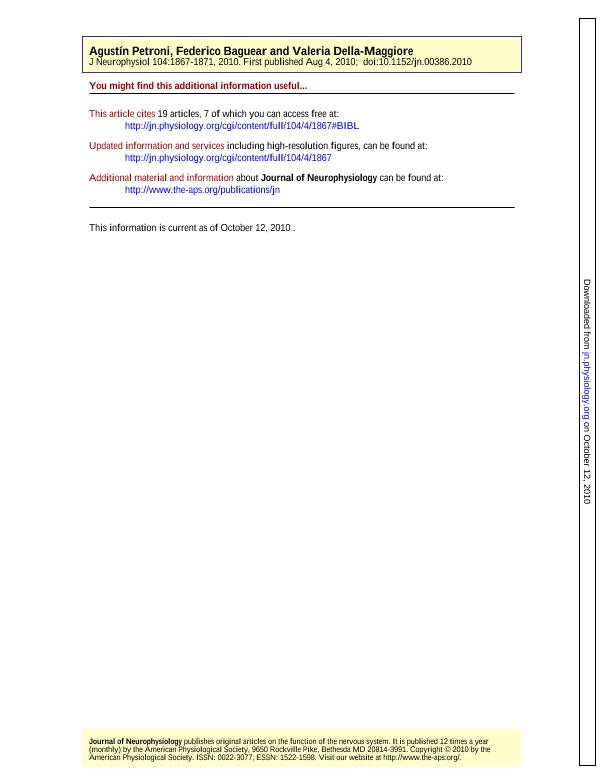Mostrar el registro sencillo del ítem
dc.contributor.author
Petroni, Agustin

dc.contributor.author
Baguear, Federico
dc.contributor.author
Della Maggiore, Valeria Monica

dc.date.available
2017-05-11T19:23:40Z
dc.date.issued
2010-10
dc.identifier.citation
Petroni, Agustin; Baguear, Federico; Della Maggiore, Valeria Monica; Motor resonance may originate from sensorimotor experience; American Physiological Society; Journal of Neurophysiology; 104; 4; 10-2010; 1867-1871
dc.identifier.issn
0022-3077
dc.identifier.uri
http://hdl.handle.net/11336/16330
dc.description.abstract
In humans, the motor system can be activated by passive observation of actions or static pictures with implied action. The origin of this facilitation is of major interest to the field of motor control. Recently it has been shown that sensorimotor learning can reconfigure the motor system during action observation. Here we tested directly the hypothesis that motor resonance arises from sensorimotor contingencies by measuring corticospinal excitability in response to abstract non-action cues previously associated with an action. Motor evoked potentials were measured from the first dorsal interosseus (FDI) while human subjects observed colored stimuli that had been visually or motorically associated with a finger movement (index or little finger abduction). Corticospinal excitability was higher during the observation of a colored cue that preceded a movement involving the recorded muscle than during the observation of a different colored cue that preceded a movement involving a different muscle. Crucially this facilitation was only observed when the cue was associated with an executed movement but not when it was associated with an observed movement. Our findings provide solid evidence in support of the sensorimotor hypothesis of action observation and further suggest that the physical nature of the observed stimulus mediating this phenomenon may in fact be irrelevant.
dc.format
application/pdf
dc.language.iso
eng
dc.publisher
American Physiological Society

dc.rights
info:eu-repo/semantics/openAccess
dc.rights.uri
https://creativecommons.org/licenses/by-nc-sa/2.5/ar/
dc.subject
Motor Resonance
dc.subject
Mirror Neuron System
dc.subject
Visuomotor Learning
dc.subject.classification
Neurociencias

dc.subject.classification
Medicina Básica

dc.subject.classification
CIENCIAS MÉDICAS Y DE LA SALUD

dc.title
Motor resonance may originate from sensorimotor experience
dc.type
info:eu-repo/semantics/article
dc.type
info:ar-repo/semantics/artículo
dc.type
info:eu-repo/semantics/publishedVersion
dc.date.updated
2017-05-10T20:33:49Z
dc.journal.volume
104
dc.journal.number
4
dc.journal.pagination
1867-1871
dc.journal.pais
Estados Unidos

dc.journal.ciudad
Bethesda
dc.description.fil
Fil: Petroni, Agustin. Consejo Nacional de Investigaciones Científicas y Técnicas; Argentina. Universidad de Buenos Aires. Facultad de Medicina; Argentina
dc.description.fil
Fil: Baguear, Federico. Universidad de Buenos Aires. Facultad de Medicina; Argentina
dc.description.fil
Fil: Della Maggiore, Valeria Monica. Universidad de Buenos Aires. Facultad de Medicina; Argentina. Consejo Nacional de Investigaciones Científicas y Técnicas; Argentina
dc.journal.title
Journal of Neurophysiology

dc.relation.alternativeid
info:eu-repo/semantics/altIdentifier/url/http://jn.physiology.org/content/104/4/1867.long
dc.relation.alternativeid
info:eu-repo/semantics/altIdentifier/doi/http://dx.doi.org/10.1152/jn.00386.2010
dc.relation.alternativeid
info:eu-repo/semantics/altIdentifier/url/https://www.ncbi.nlm.nih.gov/pmc/articles/PMC2957457/
Archivos asociados
